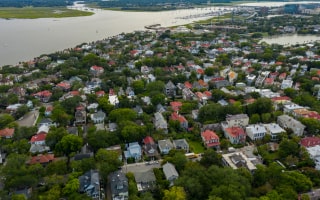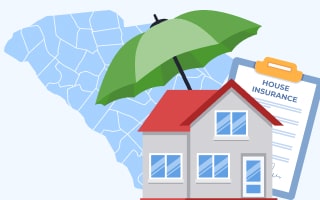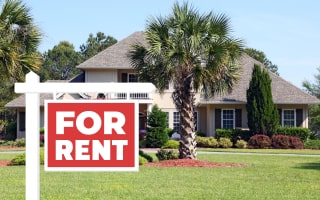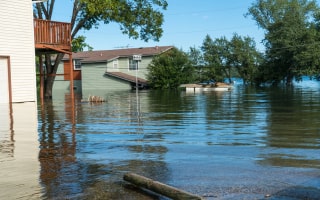Homeowners Insurance in South Carolina

South Carolina is known for its beautiful golf courses, sandy beaches, and historical sites. Located in the Southeast of the United States, it experiences terrible weather, including tornados, landslides, earthquakes, hurricanes, and floods. Since 1953, South Carolina has had 30 federally declared disasters, and the rate of disasters per 1 million people is 5.49.
Along with natural disaster claims, South Carolina residents also file claims for fire, theft/break-ins, hail, liability issues, and water damage due to burst pipes.
Neither the federal nor state governments require homeowners to purchase insurance. If you borrow money to buy a home, your lender will demand that you purchase homeowners insurance and keep it active for the life of the loan. They will also require specific coverage limits.
As of October 2024, the national home insurance average is $2,728 per year or $227 monthly. South Carolina homeowners pay an average of $2,233, which is only slightly below the national average.
Types of Homeowner Insurance Coverage Available in South Carolina
Every U.S. state has several home insurance carriers that choose to operate there despite specific perils. These insurance providers choose the coverage and limits they want to offer. The available types of coverage in South Carolina include:
-
Dwelling: Dwelling coverage protects the structure of your home (roof, foundation, walls, plumbing, electrical, etc.). It pays to replace or repair your home if it is damaged or destroyed by a covered event.
-
Personal Property: Personal property coverage protects your belongings and will pay to replace your items if they are stolen or destroyed by a covered peril.
-
Liability: If someone is hurt on your property and they sue you, your liability coverage will pick up the tab for your legal expenses up to a specific limit.
-
Other Structures: Other structures coverage pays to replace detached items if a disaster destroys them. These include things like garages, fences, pools, fountains, sheds, and hot tubs.
-
Medical Payments: Medical payments pay the medical bills of anyone who is injured on your property.
-
Additional Living Expenses (ALE): If you must leave your home after a disaster, ALE insurance will pay for your living expenses (food, lodging, pet boarding, furniture rental, travel, etc.) until you can return home.
Due to the miles of coastline, South Carolina residents should also consider flood coverage and an umbrella policy to cover any gaps in coverage.
FEMA (Federal Emergency Management Agency) manages the National Flood Insurance Program (NFIP) through a network of 50 providers across the U.S.
Since most homeowners insurance does not cover floods, this supplemental coverage can repair damage and replace items after a flood. Depending on your options, it can cover the building and/or your personal belongings. This program is available to homeowners, renters, and businesses. Learn more about the program on FEMA's website.
Home Insurance and Natural Disasters
Natural disasters are becoming more commonplace all over the U.S. Climate change is the number one driver of home insurance rates today. As these events become more frequent, insurers experience more claims and losses. Over the past five years, insurance rates have spiked by 34% and as much as 60% in some areas. In South Carolina, home insurance rates have increased by an average of 9.2%, which is far less than in most states.
South Carolina is prone to nasty weather events like tornados, landslides, earthquakes, hurricanes, and floods. A claim for water damage costs insurance companies an average of $11,650. The cost of one fire incident averages $77,340, and wind and hail damage costs an average of $11,695 per claim. From 2015 to 2019, insurance providers lost a total of $732,084,200 in claims. South Carolina averages 36 tornadoes a year. From 1980 to 2024, South Carolina had 97 billion-dollar disasters.
How Can I Save on Homeowner Insurance Premiums in South Carolina?
With homeowners insurance rates on the rise, property owners must do everything they can to save money. The best way to do this is to understand what factors impact home insurance and adjust accordingly. Those factors include:
-
The Location: Your home's location factors greatly. If you live in a high-crime area like a city or an area prone to natural disasters, you will pay much more for home insurance than if you live in the suburbs or an area safe from perils.
-
Home's Size: The larger the home, the more your premiums will be. That is because it will cost more to rebuild after an accident.
-
Home's Condition: Homes in good condition cost far less to insure than run-down homes.
-
Age of the Home: The age of your home also matters. Newer homes cost much less to insure than older homes.
-
Your Credit Score: People with good credit get better home insurance rates than those with poor credit.
-
Claims History: Anyone who files many small claims, even with other carriers, will pay more for home insurance.
-
Your Deductible: The higher your deductible, the lower your rates will be. Conversely, the lower the deductible, the higher your rates.
-
Risks: You will pay more for your insurance if you have additional risks, like a pool or hot tub.
-
Coverage Amounts: The more coverage you have, the higher your rates will be.
-
Financed or Owned: If you own your home, you get to choose your coverage levels. If you finance your home, your lender will dictate your coverage levels.
-
Construction Materials: The materials used to build your home also affect your home insurance rates. If luxury or expensive materials were used, you would pay more.
-
Pets: Some types of pets are considered risks, and you will pay more for your insurance if you have them.
Some ways to save on home insurance include:
- Shop Around/Ask for Recommendations: Ask for recommendations before landing on a provider. Shop around and get multiple quotes before deciding.
- Raise Your Deductible: Raise your deductible as high as possible to lower your rates.
- Disaster-Resistant Upgrades: Strengthen your home's roof, windows, and siding to make it more disaster-resistant and lower your rates.
- Ask for Discounts: Ask your insurance agent for any applicable discounts.
- Bundle Your Policies: Bundle your policies with the same insurer to get a discount on your insurance.
- Remain Loyal: Stay with the same carrier for years, and they may reward you with lower rates.
- Avoid Risky Upgrades: Don't add a pool, hot tub, tree house, or other risk to your property to keep rates affordable.
- Fix Your Credit: Work on your credit and improve your score for lower rates.
- Improve Home Security: Add a security system to lower your rates and make your home safer.
- Don't File Small Claims: Avoid filing any small claims to keep your premiums as low as possible.
- Adjust Your Coverage: Adjust your coverage as necessary to lower rates.
Home Insurance Discounts in South Carolina
Home insurance protects your home against covered perils. If a disaster strikes, it will pay to repair or replace your home. Along with dwelling coverage, most policies also include personal property coverage, liability, other structures, medical payments, and ALE insurance. Some covered events are fire, smoke, hail, windstorms, theft, and vandalism.
You can obtain a policy easily. Find a provider you want to work with and apply through their website or call their 800 number. You could also find a local agent to work with for more personalized service and help determining your coverage needs. Once you apply, you will need to pay a full year in advance. After that, you can pay monthly through your mortgage escrow or once a year.
Some of the most common discounts offered by reputable insurance firms include:
- Location-Based Discount: If you live in a safer location, your provider may discount your rates, expecting fewer claims.
- Early Quote Discount: Get a quote long before you need it, and your carrier may discount you for being proactive.
- Non-smoker Discount: Non-smokers have less fire risk and earn lower rates.
- Retiree/Senior Citizen Discount: Most providers offer discounts for seniors or retired persons,
- New Home Discount: New homes cost less to insure, and homeowners will get discounts of up to 40% less when they purchase a new home.
- Fire-Safety Discount: You could earn lower rates if you install smoke alarms, sprinklers, and fire extinguishers.
- Security/Safety Discount: Install a home security system, and your provider could lower your rates for being proactive.
- Claims-Free Discount: Stay claims-free for as long as possible to keep your insurance premiums lower.
- Paperless/Autopay Discount: If you sign up for auto payments or paperless statements, your carrier could discount your policy.
- Multipolicy Discount: Bundling policies are another way to save on home insurance.
- Military Discount: Most reputable insurance firms give military personnel and veterans discounts on their insurance.
- Professional Discount: Some professions, like teachers, firefighters, and teachers, also earn discounts on home insurance.
Common Rates Offer by Homeowners Insurance Firms
New homes cost much less to insure than older homes because they are constructed of newer fire-safe materials and code-compliant processes. Some homeowners pay up to 40% less for new homes and homes five years or younger; you can save up to 26% on home insurance. The average cost for home insurance in South Carolina for a new home is $1,340, but your actual price will vary based on many factors, including your age, the home's size, your credit, and the insurance firm.
Top 10 Home Insurance Firms in South Carolina and Average New Home Savings
| Company | % savings |
|---|---|
| Liberty Mutual | N/A |
| Hippo | N/A |
| Farmers Insurance | N/A |
| Travelers | 63% |
| Allstate | 47% |
| State Farm | 51% |
| TypTap Insurance | N/A |
| USAA | 54% |
| Auto-Owners Insurance | N/A |
| Cincinnati Insurance | 52% |
Home Insurance and Renovations in South Carolina

Home renovations can transform your living space into something spectacular but also affect your home insurance rates. Some updates increase the size and value of your home and your rates. Others decrease or increase risk by raising or lowering your rates. Some do both simultaneously with no effect on your premiums.
![]() Home Renovations that Increase Rates
Home Renovations that Increase Rates
Some home renovations that increase your rates include:
- Adding Square Footage: Adding square footage adds more room and makes the home larger. That means it will cost more to rebuild after a disaster, and your premiums will increase.
- Hot Tub: Hot tubs, pools, fountains, and tree houses are considered "attractive nuisances" that cost extra to insure because of the added risk.
- Metal Roof: A metal roof can add sturdiness to your home and make snow removal easier, but it also costs much more to replace, and your rates will increase.
![]() Home Renovations that Decrease Rates
Home Renovations that Decrease Rates
Some home renovations that decrease your rates include:
- Sprinkler System: Installing a sprinkler system will make your house much safer and fire-ready, and your insurance company will lower your rates as a result.
- Security System: Adding a security system will give you peace of mind, keep your home safer, and lower your rates.
- New Electrical System: Old electrical systems can cause fire. Replacing your wiring could save your home and prevent future fire claims, thus lowering your rates as well.
When you decide to upgrade your home, your insurance does not cover those renovations. Only damage due to a covered peril is covered by homeowners insurance. Other things not covered are those that exceed the limits specified in your policy, pest infestations, rodents, and animal damage.
Before renovating, discuss it with your home insurance agent. They can advise you on any changes needed to your policy and determine how much the upgrades will affect your premiums.
South Carolina Renters' Insurance

Renters in South Carolina also need homeowners insurance. Renters insurance is slightly different from homeowners insurance. It does not have dwelling coverage to protect the structure of the home. The owner must cover that under their own policy. Instead, renters insurance mainly covers personal property, liability, medical payments, and loss of use. Each policy has limits, so anything beyond those limits won't be covered. For example, your personal belongings are covered, but expensive items like jewelry, furs, and collectibles may not be replaced after a disaster.
Some of the items that renters insurance covers are:
-
Small Appliances
-
Furniture
-
Clothing
-
Bedding
-
Bath Items
-
Electronics
-
Sporting Equipment
Renters insurance is priced according to three main factors, and they are:
-
Location: Even as a renter, your location matters. If you live in the city, you will pay more than if you live in the country. If your area has many weather events, you will pay higher rates.
-
Coverage Amount: The more coverage you buy, the higher your premiums.
-
Number of Units: The more units in your building, the lower your rates.
The national average for renters insurance is between $15 and $20 monthly. South Carolina renters pay an average of $148 a year, or $12 a month, which is less than most states.
Condo Insurance in South Carolina

Condo owners also need homeowners insurance. Like renters, condo insurance is slightly different. The dwelling coverage is limited to the interior only. Condo developments have their own master policy, which covers the building. After a disaster, it will rebuild the condo back to its original condition (when first built). Most condo owners have long since updated their kitchens, baths, flooring, fixtures, and appliances. HO-6, or condo insurance, pays to replace the interior and restore it to its most current condition. Condo insurance also includes liability, medical payments, personal property, loss of use, and loss assessment coverage.
Whereas renters insurance does not cover dwellings, condo insurance does, but it is limited to "walls-in" only. Plus, the liability coverage only works if the person is hurt inside the condo, not outside or on common grounds.
Condo insurance covers the following items after a disaster (fire, windstorm, theft, vandalism):
- Interior Walls
- Appliances
- Flooring
- Cabinets
- Countertops
- Light Fixtures
- Wiring
- Plumbing
- Personal Belongings
Condo owners in South Carolina pay an average of $375/year or $31/month for insurance. That's about half the national average of $625/year for $60,000 in personal property, $300,000 of liability, and a $1,000 deductible.
Some ways to save on condo insurance include:
- Raise Your Deductible
- Review and Adjust Your Policy Every Year
- Improve Your Credit
- Stay Claims Free
- Shop Around for the Best Rates
- Bundle Policies
- Improve Home Security
- Install Fire Safety Devices
- Ask for Discounts
- Remain Loyal to the Same Provider
South Carolina Home Insurance Market
Throughout the rest of the U.S., the home insurance market is losing money. However, insurance providers have enjoyed healthy profits in South Carolina for the past ten years. With more frequent disasters, however, that tide may soon turn. If it does, providers will start to experience losses and possibly limit coverage or some customers to compensate.
South Carolina is subject to tornados, landslides, earthquakes, hurricanes, and floods. There is potential for severe disasters and significant insurance losses. Providers have been lucky until now, but that could soon change, and residents may have trouble finding the coverage they need.
There is no federal agency that regulates the home insurance industry. Instead, states appoint a department to handle all customer complaints, perform investigations, monitor providers and rates, and sanction guilty firms. In South Carolina, that agency is the South Carolina Department of Insurance, located at 1201 Main St., Suite 1000, Columbia, SC 29201.
Homeowners Insurance Guide
- Homeowners Insurance in South Carolina
- Types of Homeowner Insurance Coverage Available in South Carolina
- Home Insurance and Natural Disasters
- How Can I Save on Homeowner Insurance Premiums in South Carolina?
- Home Insurance Discounts in South Carolina
- Home Insurance and Renovations in South Carolina
- South Carolina Renters' Insurance
- Condo Insurance in South Carolina
- South Carolina Home Insurance Market
Instant Access to South Carolina Property Records
- Owner(s)
- Deed Records
- Loans & Liens
- Values
- Taxes
- Building Permits
- Purchase History
- Property Details
- And More!
Homeowners Insurance Guide
- Homeowners Insurance in South Carolina
- Types of Homeowner Insurance Coverage Available in South Carolina
- Home Insurance and Natural Disasters
- How Can I Save on Homeowner Insurance Premiums in South Carolina?
- Home Insurance Discounts in South Carolina
- Home Insurance and Renovations in South Carolina
- South Carolina Renters' Insurance
- Condo Insurance in South Carolina
- South Carolina Home Insurance Market